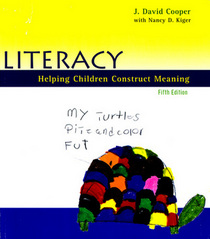Search -
Literacy: Helping Children Construct Meaning, Fifth Edition
Literacy Helping Children Construct Meaning Fifth Edition
Author:
This reading methods text focuses on a contemporary, active learning approach for teaching literacy. Its 11 chapters and teacher resource handbook help teachers develop balanced literacy programs using both direct and indirect instruction.One of the text's hallmark features is its complete presentation of authentic children's stories, ... more »
Author:
This reading methods text focuses on a contemporary, active learning approach for teaching literacy. Its 11 chapters and teacher resource handbook help teachers develop balanced literacy programs using both direct and indirect instruction.One of the text's hallmark features is its complete presentation of authentic children's stories, ... more »
ISBN-13: 9780618192601
ISBN-10: 0618192603
Publication Date: 7/2002
Pages: 559
Rating: ?
ISBN-10: 0618192603
Publication Date: 7/2002
Pages: 559
Rating: ?
0 stars, based on 0 rating
Genres:
- Literature & Fiction >> Books & Reading >> Literacy
- Nonfiction >> Education >> Education Theory >> Contemporary Methods >> Language Experience Approach





